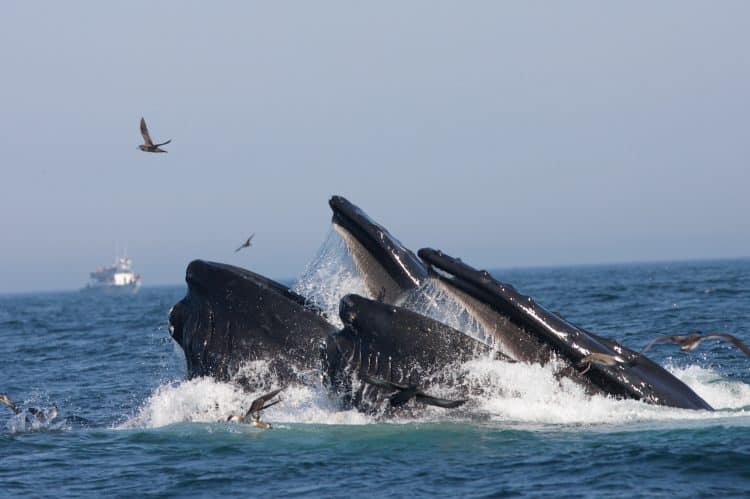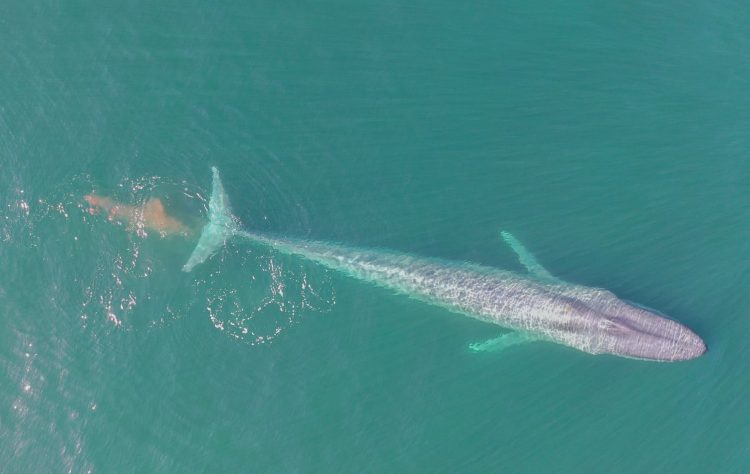Scientists believe the ravenous appetites of baleen whales – Earth’s largest creatures – and their prodigious waste – hold clues to the very health and productivity of our oceans.
Baleens include the humpback, fin, minke and blue whale, the latter being the largest creature ever to live on Earth.
The carnivorous marine mammals catch and consume vast amounts of prey. And they recycle ocean nutrients by excreting undigested food in what have been described as “volcano-like” movements.
By attaching tags to the backs of 321 whales from seven baleen species, the researchers now reckon that – before the onset of whaling in the twentieth century – and in the Southern Ocean alone – baleens were, amazingly, consuming more than twice what the world’s entire marine fisheries catch today.
Before whaling ramped up in the 19 hundreds in the Atlantic, Pacific, and Southern Oceans, they probably ate 430 million tonnes of Antarctic krill (small crustaceans found in all the world’s oceans) each year.
That’s up to thirty percent of their entire body mass, on average, and, in some areas of the ocean at least, triple the volume previously thought. And, incredibly, it’s twice the total biomass of this entire species of krill thought to exist today.
The scientists hope, if baleen numbers could somehow recover to what they were before that twentieth century whaling, their “nutrient recycling services” could not only help boost ocean productivity but restore ecosystem functions to their previous glory.
According to the Smithsonian Institute, which was involved in the study, whales both eat and excrete immense amounts of iron. It is an important nutrient which spurs the growth of phytoplankton blooms.
If it weren’t for the whales, this valuable nutrient would sink from near the surface, where the whales live (and where the iron is needed), to the bottom where it would be lost.


The findings have just been published in the journal, Nature. Lead photo: A blue whale (Balaenoptera musculus) defecates. Photo credit-Ryan Lavery (Smithsonian).
What you can do
Support ‘Fighting for Wildlife’ by donating as little as $1 – It only takes a minute. Thank you.
Fighting for Wildlife supports approved wildlife conservation organizations, which spend at least 80 percent of the money they raise on actual fieldwork, rather than administration and fundraising. When making a donation you can designate for which type of initiative it should be used – wildlife, oceans, forests or climate.
Larry Powell
I’m a veteran eco-journalist living in Shoal Lake, Manitoba, Canada. I have a life-long love of wildlife & natural places. After working for radio and TV stations for about 30 years, I've turned to science writing as a freelancer specializing in the Earth Sciences. I’m a member of the Science Writers & Communicators of Canada and the American Association for the Advancement of Science. I’m authorized to receive embargoed material through the Science Media Centre of Canada, the Royal Society, NatureResearch and the World Health Organization. This allows me advance access to important, peer-reviewed research often warning of habitat loss and the threat of extinction facing many wild species, usually thanks to human intrusion and intervention by the hand of man. They then often become "hot-off-the-press" stories which are ready to publish the moment the embargoes are lifted. I publish www.PlanetInPeril.ca (PinP) "Where Science Gets Respect." I own professional photographic gear and am sometimes able to enhance my stories with my own images.
- Web |
- YouTube |
- More Posts(14)



Leave a Reply